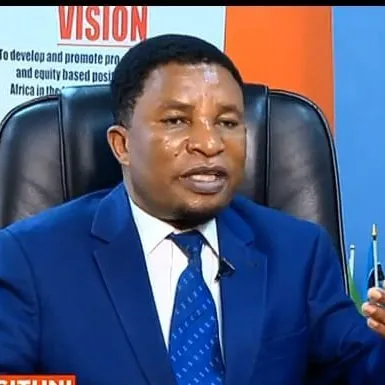
By Jeff Kapembwa
The consortium of non-state actors attending the November 11-21 COP summit in the Amazon city of Belem-under the auspices of the Pan-African Climate Justice Alliance (PACJA) in their 10-point demand, contend that time is running out to act as espoused and want action to save the planet.
In an Africa’s Message to the World: COP30, the campaigners remain candid in their quest for COP 30 to be realistic and make a ‘Turning Point for Climate Justice and Global Solidarity, through among other actions, operationalize the Loss and Damage by 2035.
The 10-point demand, seeks that the COP 30 should be the time to actualize various promises made since inception.
There is unwavering need for organisers of the climate conference to deliver on its $1.3 trillion annual target by 2035, starting with a $300 billion annual goal that prioritizes adaptation and loss and damage as the continent and world grapple to insulate.
Voluntary pledges equate justice to charity, a departure from the spirit of the Paris Agreement. Climate reparations must flow directly to affected communities, protecting livelihoods, workers, and children displaced by disasters.
“Operationalize the Loss and Damage Fund for Frontline Communities After decades of delay, the Loss and Damage Fund must become fully operational: accessible, simplified, and grant-based.” PACJA, representing 10,000 voices from various stakeholders said in a statement.
The climate change campaigners, embracing among others, civil society, youth, women, faith groups, labour, academia, and frontline communities, are resolved to see the ongoing COP 30 to deliver justice, resources, and equitable action.
COP30, rightly called the People’s COP, recalls the spirit of the 1992 Rio Conventions. PACJA urges the COP 30 not to ignore the unfolding and overlapping climate-induced crisis; debt, inequality, and geopolitical fragmentation.
For Africa, non-state actors contend, these ‘crises define daily reality for millions whose livelihoods, health, and security are already under siege, arguing:
“‘Today, we reaffirm Africa’s resolve to lead boldly, speak truth to power, and demand outcomes that reflect our realities and uphold our rights’.
The non-state actors remain confident they will be heard and that their Expectations and Demands Climate Justice and Equity Are Non-Negotiable Africa comes to COP30 united behind the principle of common but differentiated responsibilities. Climate justice and equity must anchor every decision.
The continent’s right to development and to eradicate poverty cannot be traded away in the name of ambition defined elsewhere.
Adaptation Must Come with Means of Implementation
The Global Goal on Adaptation (GGA) cannot stand on indicators alone.
Without financing, it argues, indicators are empty promises. Africa demands a tripling of adaptation finance by 2030— delivered as grants, not loans—and prioritizing locally led adaptation, women, and youth at the centre of decision-making.
This finance must be new, additional, predictable, and grant-based. Loans are not climate finance; they are climate debt.
It is desirous to see the Reform Global Finance Architecture for Justice actualized. It calls for deep reforms in global finance systems to end Africa’s debt crisis, cancel illegitimate debts, and democratize multilateral institutions.
Climate finance must not reinforce dependence but expand fiscal space for just, people-centered transitions. Climate reparations must flow directly to affected communities, protecting livelihoods, workers, and children displaced by disasters.
There is need to Support Africa’s Just Transition as a Global Public Good Africa’s just transition is central to global stability.
It outrightly rejects extractive models and unilateral trade measures such as the Carbon Border Adjustment Mechanism that punish African economies.
It opts and calls for sustained investment in local value addition, decent green jobs, and regional governance of critical minerals. On the low energy availability, PACJA recognises the impact on Africa’s development.
There be urgent action taken to redress the impasse, having thrown over 630 million Africans inn darkness, yet access to the commodity is both a moral and climate imperative and it be affordable.
“COP30 must formally recognize access to affordable, clean energy as part of the global mitigation framework and support Africa’s goal to add 300 GW of renewables and reach 300 million people by 2030 under Mission 300.”
Gender Justice Is Integral to Climate Justice Women and girls bear the heaviest climate burdens. Their leadership must be recognized, resourced, and protected, the statement reads.
Climate action that ignores gender equity is unjust and unsustainable. Anchor Just Transition in Social Protection and Decent Work A just transition for Africa must create jobs, protect workers, and build inclusive economies.
Every climate finance instrument must include labour safeguards and support for retraining and youth employment in green sectors.
Defend Multilateralism and Solidarity at a time when nationalism and climate denial threaten collective progress, COP30 must renew faith in multilateralism.
The Global North must show good faith by honouring commitments, rebuilding trust, and working in partnership, not paternalism.
PACJA’S Call to Action Africa’s message to COP30 remains unchanged and that the action does not seek sympathy; but that be a solidarity reaction. COP 30, PACJA is optimistic that it will be the arbiter of all unfulfilled demands and that solutions to climate challenges should not be delayed.
“Let COP30 in Belém mark the moment when the world chose fairness over delay, partnership over pity, and justice over convenience.
“We are not victims of the crisis; we are co-authors of the solution. But justice requires that those responsible for the problem shoulder their fair share of the response.
“The Kenya based-advocacy group-PACJA is headquartered in Kenya and is headed by Mithika Mwenda, a Co-Founder, and Executive Director.
It has been named among 100 top most influential individuals in the world for 2022/23 year period by the apolitical.co.
